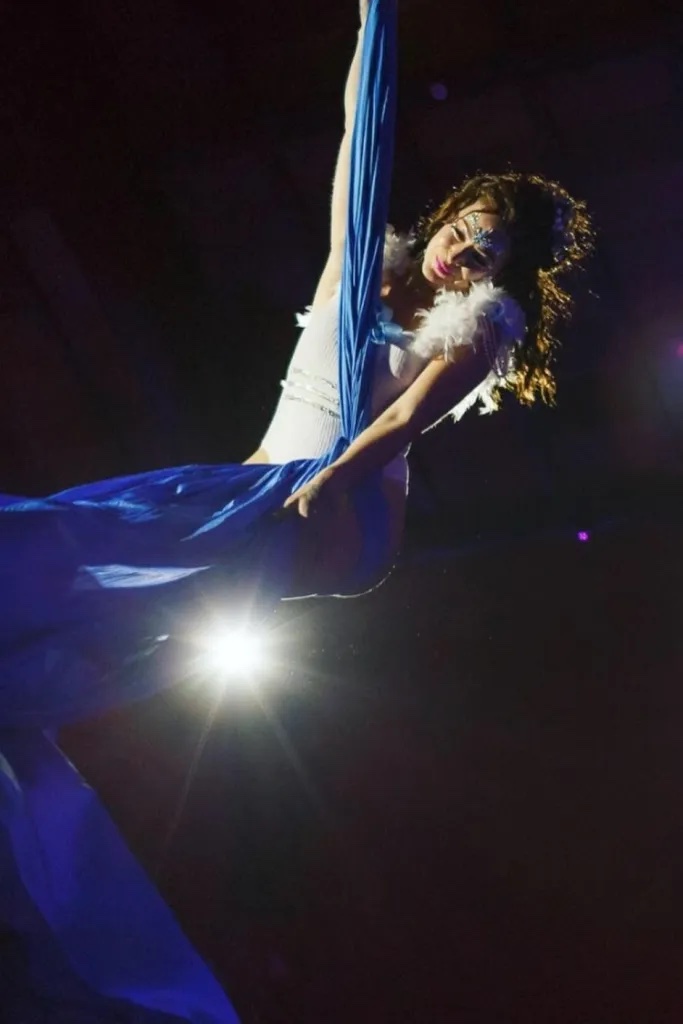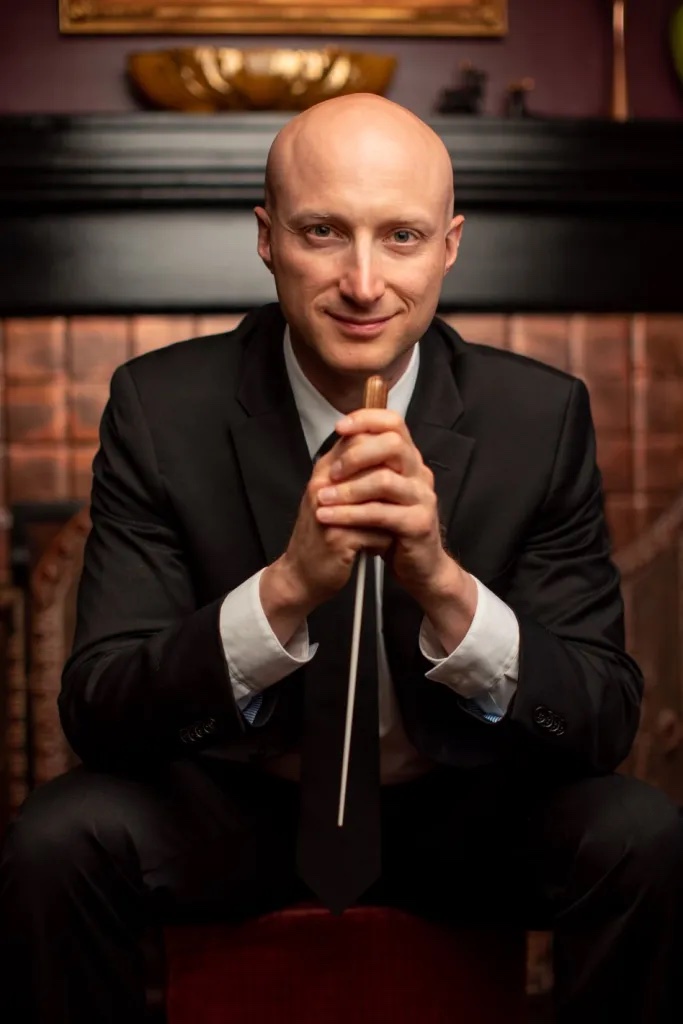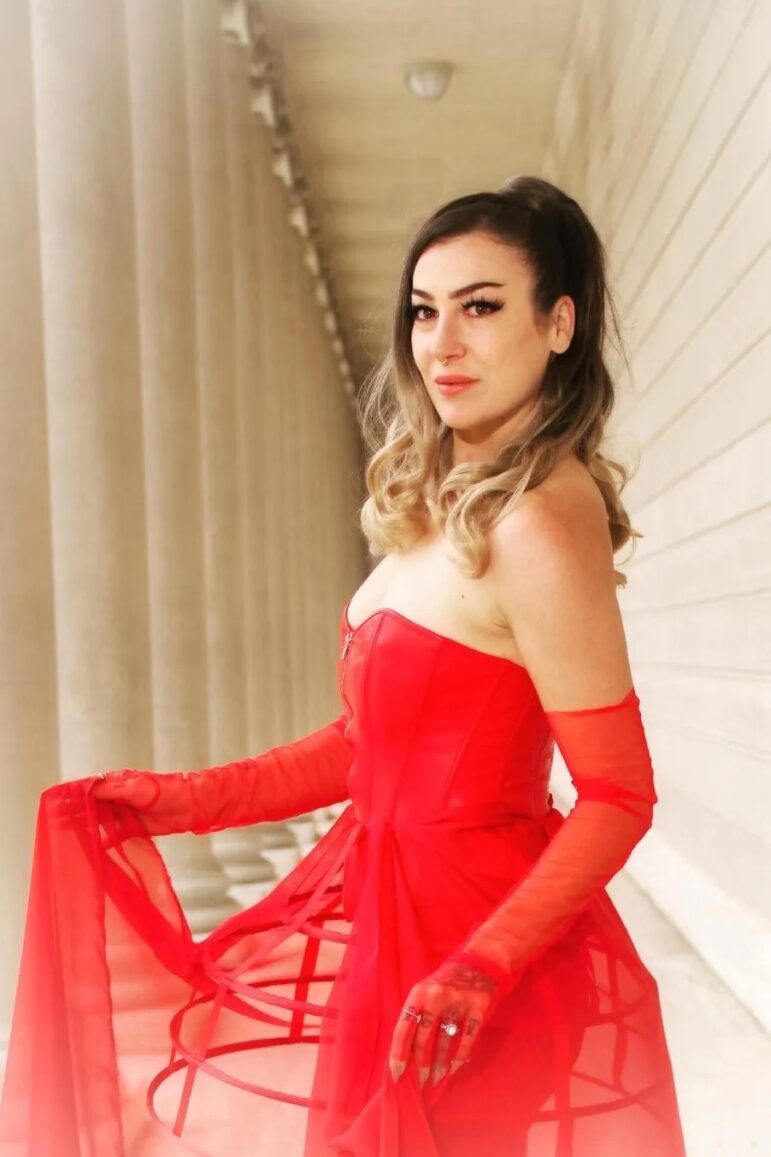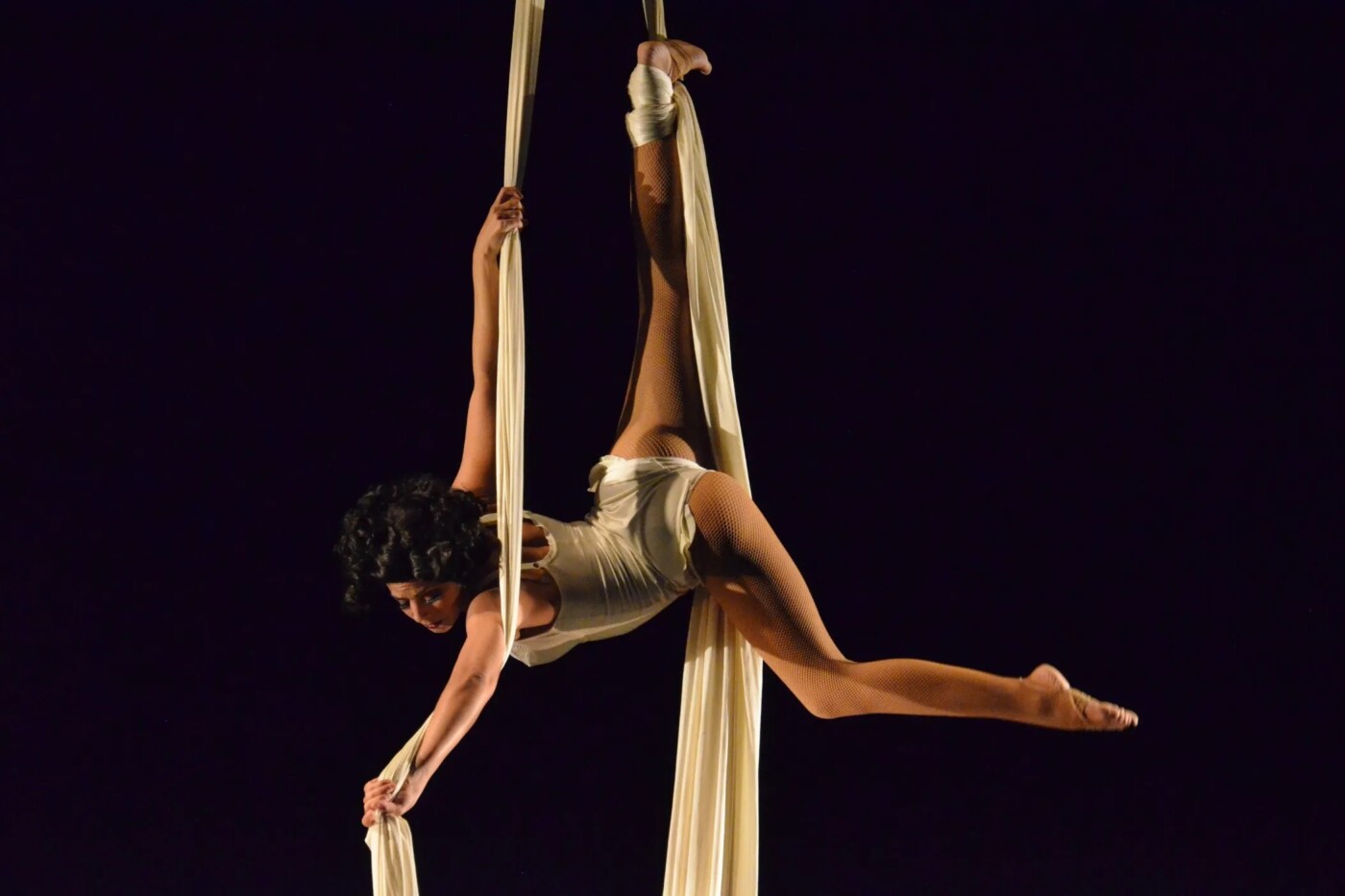Though Sophia Santulli’s background is in opera (she has a master’s degree from the San Francisco Conservatory of Music), she’s not averse to merging that background with other genres, as she does via her EDM pop persona Sophia Prise. Yet the thought of merging opera with the physical art of aerial silk was an idea that came from the most unexpected of places.
“I had a dream once that Kate Bush [..] was doing aerial,” she says, recalling the 2016 spark of inspiration. “It was a very vivid dream! A week later I signed up for aerial lessons. By 2017, I was singing in the air, performing solo pieces at parties and festivals, but my vision grew as I realized I wanted to ‘bring opera into the fifth dimension’—teasing out an extra layer of musical and poetic expression by integrating aerial movement in full opera productions, not just five-minute solo routines.”
After a pandemic-induced hiatus from such grand productions — including a 2019 adaptation of Bizet’s “Carmen” — Santulli is returning to singing with silks for “Cavalleria Rusticana: A New Aerial-Opera Production.” The show updates the classic 1890 opera (composed by Pietro Mascagni with libretto by Giovanni Targioni-Tozzetti and Guido Menasci), transferring the action from late-1800s Sicily to same island during the swinging 1960s (no pun intended). It’s a tale of jilted lovers and unwavering passion set against the backdrop of the Mediterranean. The international cast includes Korean soprano Yuji Bae, aerialist Nina Sawant, and Santulli, who also directs.

She’s producing the show through Opera on Tap, a performance collective with chapters all over the country created to bring opera out of expensive grand auditoriums and into more accessible venues. In addition to pandemic shutdowns, the San Francisco chapter (led by Santulli) found its last in-person production caught up in a scandal surrounding BrownPaperTickets, the service frequently used by independent artists. When the company’s owed funds finally arrived, Santulli put a deposit at Dance Mission Theater and began plotting out “Cavalleria.”
She recently shared her thoughts about merging genres and why century-old operas still have relevance to contemporary audiences.
Arias are traditionally performed with limited movement; what special work arounds are needed when aerials are added to the mix?
Sophia Santulli: Every piece is different, but I generally choreograph the more strength-based moves in-between vocal lines so I’m free in static pose to express without everything becoming too arduous. I do really enjoy singing upside down though. It’s quite a head rush.
“Cavalleria Rusticana” takes place in 19th century Sicily, which your production moves up to 1962 Sicily. Why that particular year?
In the sixties, Italy was enjoying an economic boom, and women were gaining more access to education. I wanted to indulge in this feeling of being in a land of plenty, in abundance, coming out of such a staid time as we all have the past couple of years worldwide. Further, Italy as a whole was still heavily influenced by Christian Democratic rule in the sixties, but trends were surging toward the more secular, the effects of which wouldn’t be fully apparent until the 1980s.
It’s this tension between the natural pulse of human nature and a traditional religious structuring of life that the opera so artfully holds in dichotomy. Both torrid affairs and beautiful religious ceremonies are encapsulated on one Easter Sunday. Also, being costume designer of the production as well, I rather liked the idea of our Sicilian country people learning to be a bit more fashion-forward.
Since you serve as both director and performer, how do you maintain objectivity about the action onstage?
With the [Franco] Zeffirelli film as my guide! I watched four other versions of the opera but kept returning to his production. Just immersing myself in the music and trying to understand the characters with beginner’s mind was a good start. Then doing the initial staging with my cover singing Lola was helpful, so I could see the scene objectively. Lola is a featured, but small part, so I try not to overstate my importance or take it over. But when I directed “Carmen,” it was my entire reimagining of the opera, so I really had something to say about the character in context of opera and was admittedly not objective at all!

Did you pick cast yourself or did they find their way to you?
[Music director] Paul Schrage and I held auditions in November 2022 and then afterward had a lovely meal at Zuni Café, hashed it out over a gorgeous bottle of his favorite Bordeaux, and cast the opera together Santulli —a memorable event!
Opera on Tap’s mission is to make the art form more accessible. This leads to the classic question (condescending though it may be): What does opera have for “regular” people to enjoy?
I think it’s the visceral feeling you get being in the room with that kind of singing. It’s a full-spectrum vibration and a full-bodied instrument. In a way, I think that’s why I feel opera goes so well with aerial. You don’t even have to know how it’s happening or what you’re supposed to think about it — the excitement is undeniable.
As with many classic Sicilian and Italian stories, “Cavalleria’s” plot famously features themes of lust, jealousy, revenge and lost love. Is there such thing as “over the top” in portraying those themes?
I honestly think the story is pretty true-to-life and connects to a modern audience. It doesn’t seem fake or soap-opera-ish to me. The classic tale of a cheating man who gaslights his jilted lover and doesn’t stop to think with his “real” brain until it’s too late. The complicated feeling of truly loving someone and yet, not admitting to them or even yourself that you’re hurting them. And then taking your pride to the edge, to the point it becomes dangerous— and you get your just desserts. I simply staged the opera as honestly as I could without being gratuitous, telling a story I think could really, truly happen (admittedly with less singing).

The world has also grown more sensitive to issues regarding male gaze and female autonomy since the opera first premiered. How do you apply that modern point-of-view to an old story whilst still maintaining the key elements of the plot?
I have made a point to make sure Santuzza’s character development has a trajectory, that she’s not just this pathetic figure. I want the audience to see how strong she truly is through this opera, and that being in love with a flawed man does not make her despicable in any way — after all, she’s the only one who could actually save him from himself if he’d let her. As far as the male gaze, it’s made plain in this opera. It exists, we see it in action, and we see how it diminishes not only the woman objectified but also the man stooping to such objectification.
As an experienced musician, have you ever thought of creating your own opera or musical from scratch?
Yes! I have been turning around ideas in my head for some time, and plan to compose a solo aerial opera when I grasp the story I want to tell more fully. It’s such a precious thing to me that I don’t want to force it just to say I did it. But yes, that’s absolutely in my future.
Speaking of your own music, how close are you to releasing new material?
I have a double single release this year with my band, Everything But The Everyrhing, a post-punk glam-garage outfit. I’ve written the lyrics and melody and put down the studio vocals for one of the two so far. For my own productions, I’m currently obsessed with creating electro-pop that actually has elements of true Detroit/Classic/Modern Electro, so my perfectionism might push that endeavor of a new EP to 2024. I have to admit, I’m only one woman!
In light of its radical changes and closing venues, how healthy do you think the Bay Area remains for independent artists and producers?
I think it’s still pretty good as far as being able to book a venue and stretch your limbs as an independent artist. I think there are ton of people still here doing exciting things with production; I’ve gotten asked to do two collars this year. But with people holding on more tightly to their wallets, it’s hard sometimes to get people off of their phone-filled entertainment and out to a venue. I hope to keep pushing to change that.
Opera on Tap-San Francisco’s “Cavalleria Rusticana: A New Aerial-Opera Production” runs at 8 p.m. March 3-4 and 7 p.m. March 5 at Dance Mission Theater, 3316 24th St., San Francisco. Tickets are $25-$55; visit https://dancemissiontheater.org .
